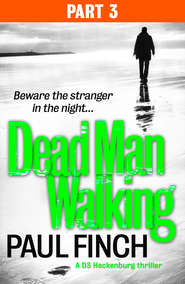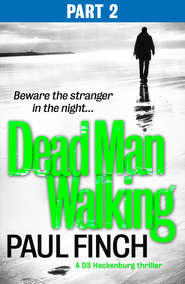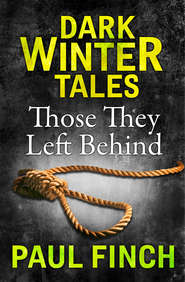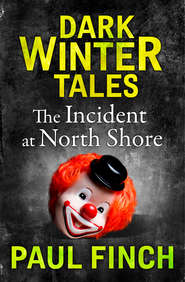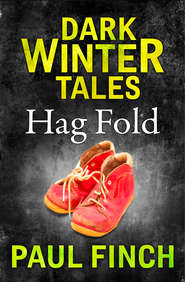По всем вопросам обращайтесь на: info@litportal.ru
(©) 2003-2025.
✖
Best of British Crime 3 E-Book Bundle
Настройки чтения
Размер шрифта
Высота строк
Поля
‘Tell her we know what we’re doing. We’re professionals … we’re pretty good at this sort of thing.’
‘Why should we trust you now? After three years of hearing nothing.’
‘Because we’re all you’ve got.’
She gave a scornful smile. ‘That’s what I thought.’ She climbed from the car, humping her pack onto her shoulder. ‘Why should the law-abiding community tremble, eh?’
‘Don’t forget to report that hire van stolen,’ Heck called after her.
She gave him the finger, before limping off towards the station steps.
Heck drove away. It was quite an irony, of course. Given the job that lay ahead of him, if there was one thing he really could have made use of right now, it was a wingman.
Chapter 15 (#ulink_20d01532-9dc1-5e6d-919e-4ea397df7e6b)
In police terms, Salford was a legendary district.
Existing as a city in its own right, but enclosed by the larger Greater Manchester conurbation, it was regarded as one of the toughest beats in Britain outside London. It fell within the Greater Manchester Police’s F-Division, described to Heck on his last day of basic training, when he’d learned that he was being posted there, as: ‘A big, dark, noisy, chaotic, rain-soaked, urban hell!’
Heck had done two years as a cop in Manchester before transferring down to London. It wasn’t a long time in reality, but it was long enough if you were working on as busy a division as ‘the F’ to get to know every one of its nooks and crannies. Once a manufacturing hotbed and busy dockland on the Manchester Ship Canal, Salford had endured severe unemployment since the mid-twentieth century and, as a result, had come to suffer some of the worst social and housing problems the northwest had ever seen. Modern regeneration schemes had spruced up certain parts of it – Salford Quays saw the creation of attractive and costly canal-side residences, but other parts of it were still agonisingly depressed. The Industrial Revolution-era slums had been cleared away en masse in the 1960s, and replaced with austere, high-rise architecture, which had very quickly degenerated into slums of a different sort. Some sections of the town were now wastelands of graffiti-covered tower blocks, boarded-up shops and rubbish-strewn subways.
Heck arrived in one such locality around six o’clock that evening. His Fiat, already old and beaten-up, was additionally dirty from the chase across the spoil land, so no eyebrows were raised as he prowled between rows of identical concrete maisonettes that were more like World War II bunkers than dwelling places.
Ron O’Hoorigan supposedly lived at fourteen, Lady Luck Crescent, a spectacularly misnamed cul-de-sac. On one side of it lay the maisonettes, on the other a row of poor quality council houses. The gutters were scattered with litter and broken glass, there was scarcely a gate or fence left intact, and those remaining were covered in spray paint; the burnt hulk of a car occupied the turning circle at the far end.
Identifying number fourteen as one of the maisonettes, he cruised to a halt some three buildings down, where he considered how best to play it.
At length, he decided that the easiest option was to introduce himself as a police officer and invent some imaginary crime that he could claim he was looking into. He checked again through O’Hoorigan’s print-out. O’Hoorigan, whose lean hatchet-face glared up at him from the attached glossy, was a professional burglar – mainly small time, though his last offence had involved the tying up of two terrified householders. On arrest, he’d thus been charged with aggravated burglary, which was the reason he’d finished up serving seven in Rotherwood high security unit. Another such conviction and he’d likely go down for twenty, which gave Heck quite a bit of leverage. He’d make something up and demand an interview. O’Hoorigan would be eager to clear himself and, that way at least, Heck could get a foot in the door and start asking questions about Klim.
He climbed from the car, locked it, and walked back along the pavement and up the path to number fourteen. The tiny front garden was an unkempt mass of weeds. The front window had what at first glance looked like drawn curtains, though at second glance these turned out to be hanging bed sheets.
Heck knocked on the red, soft-board door and waited. There was no response. He knocked three times in total. Still there was no response. Eventually, he crouched and peeked through the letter flap. A musty smell, like old sweat, exuded out from it. Nothing was visible inside except vague outlines and dust. He moved away from the front door, and peered down a side passage cluttered with rubbish. An iron gate had once barred access to it, but this now hung from rusted hinges. He pushed his way through, wincing as the corroded metal squealed, and then advanced warily. When an empty emulsion tin clattered away from him, he froze – but there was no sign that any of the neighbours had heard, or cared if they had.
At the end of the entry was a small garden, though its grass was thickly overgrown, and the scabby thorn bushes along the fences to either side were hung with rags and waste paper. An old fridge had been dumped in the middle; its open door yawned on mouldy blackness. The windows at the rear of the maisonette had also been covered from the inside, one with stained sheets and another with newspaper. There was a back door, but it was firmly closed. The window panel in it contained frosted glass, so he couldn’t see through.
Heck then heard the squeal of the entry gate again.
He listened as echoing footfalls sounded in the passage. There was a familiar clatter as another foot clouted the emulsion tin. He tensed, moving away from the back of the house, onto the more open ground of the garden.
A figure rounded the corner into view.
Heck couldn’t believe his eyes.
‘So who lives here?’ Lauren asked.
‘What the bloody hell are you doing?’ he hissed, dashing forward and glancing past her down the entry; there was nobody else there. ‘Well?’
She shrugged. ‘I told you, I’m not just going home.’
‘I put you on a sodding train!’
‘No, you didn’t. You kicked me out of your motor. It wasn’t difficult getting a taxi outside a railway station. I think the driver was quite chuffed when I said “follow that car”.’
‘For Christ’s sake, Lauren, this is not a game!’
She looked irritated. ‘You’re telling me that? My sister’s been missing for …’
‘I’m sick of hearing about …’
‘You’re sick of hearing about her?’
‘I didn’t mean it like that. Look, Lauren …’ Her gaze burned into him as he made a succession of helpless gestures, only his concern for discretion keeping him from shouting. ‘Lauren … criminal investigation is a serious business. You can’t play at it like this.’
‘I want to know what’s happening,’ she said firmly. ‘I want to know what leads you’ve got.’
‘Do I really have to arrest you?’
‘Try it. And I’ll tell the first inspector I meet that you advised me to report that hire van stolen. That you were covering up a crime. In fact, I’ll go one better than that. I’ll tell your own boss. What was his name … Commander Laycock?’ She smiled when she saw his startled expression. ‘Ahhh … you wouldn’t want him to know, would you?’
There was no way Heck could answer that without revealing that he didn’t even want Laycock to know he was here in Manchester. He turned stiffly and walked back up the entry to the road.
Lauren followed. ‘It doesn’t have to be this way, though.’
‘You must be out of your mind,’ he replied, shaking his head but talking more to himself than to her. It defied all logic how he’d ended up in a situation like this. He’d planned this trip so carefully. He emerged onto the pavement in a daze.
‘I can help you,’ Lauren insisted.
He swung around to face her. ‘You’ll get yourself killed. And maybe me with you …’
‘You looking for Ron?’ someone asked.
They turned sharply. A man they hadn’t previously noticed was seated on a deckchair in the garden opposite. In contrast to O’Hoorigan’s, this garden had no vegetation at all – it was bare dirt. The man was youngish, but pale and rail-thin, and had hair dyed bright pink. He wore a vest and a pair of cut-off khaki shorts; he was smoking, and drinking from a tin of lager.
‘I said are you looking for Ron?’
‘Ron?’ Lauren said, crossing the road towards him.
‘Ron O’Hoorigan?’ the man said. ‘That’s his house.’
‘Yeah mate, that’s right,’ she agreed. ‘We’re looking for Ron O’Hoorigan.’
Heck crossed the road alongside her, just about managing to hold his tongue. The man eyed them. With Lauren in her dark army-surplus gear and Heck in jeans, trainers and leather jacket, they didn’t look out of place for this neighbourhood.
‘He owe you money or something?’
‘Something like that, yeah,’ she said.
The man nodded as if this was a familiar story. Up close, his face was pinched to the bone. There were matching sets of needle bruises on both his pipe-cleaner arms. ‘You’re not the only ones. He hasn’t been round here for a bit.’







